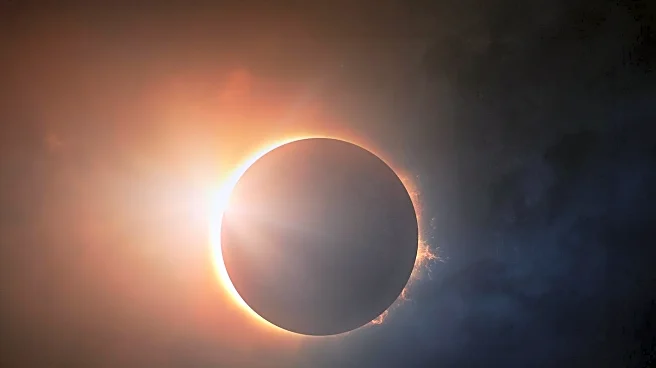What's Happening?
Eclipse Traveler has announced a new tour package named '2027 Pharaoh's Shadow' to observe the total solar eclipse on August 2, 2027, in Egypt. This six-night tour begins on July 27, 2027, with three nights
in Cairo, followed by a three-day Nile cruise, and concludes in Luxor. Participants will witness the eclipse near the Temple of Dendera, experiencing over 6 minutes and 20 seconds of totality, which is expected to be the greatest visible totality of the 21st century. The tour includes cultural exploration in Cairo, featuring visits to the Grand Egyptian Museum and the Giza Plateau, home to the pyramids and the Great Sphinx.
Why It's Important?
The 2027 total solar eclipse is anticipated to be a significant astronomical event, offering a rare opportunity for enthusiasts to experience extended totality. This tour not only caters to eclipse chasers but also promotes cultural tourism in Egypt, potentially boosting the local economy. The event is expected to attract international attention, highlighting Egypt's historical and cultural landmarks. The tour's exclusivity and comprehensive itinerary may appeal to travelers seeking unique experiences, thereby influencing travel trends towards more personalized and event-driven tourism.
What's Next?
As the date approaches, Eclipse Traveler may see increased demand for the tour, prompting potential expansions or additional offerings. Stakeholders in Egypt's tourism sector might prepare for a surge in visitors, enhancing infrastructure and services to accommodate international tourists. The event could also spark interest in future astronomical tours, encouraging collaboration between travel agencies and scientific communities to create educational and experiential travel opportunities.
Beyond the Headlines
The tour underscores the growing trend of experiential travel, where tourists seek meaningful and memorable experiences rather than traditional sightseeing. It also highlights the intersection of science and tourism, where astronomical events become focal points for travel, fostering a deeper appreciation for natural phenomena. This could lead to increased awareness and interest in astronomy, potentially inspiring educational initiatives and public engagement in scientific exploration.










